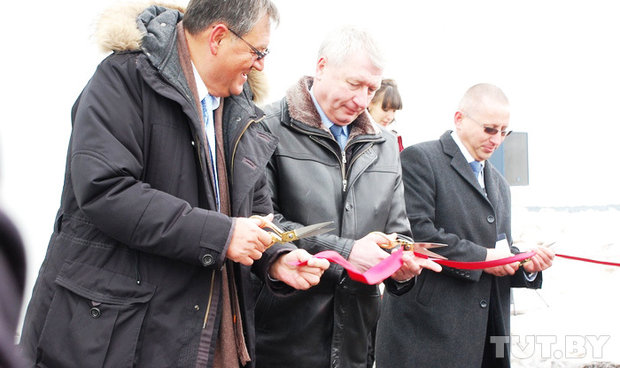
Belarus: The Dogs Bark, but the Caravan Goes On
Publication: Eurasia Daily Monitor Volume: 10 Issue: 43
By:

Multiple, if inconclusive, signs suggest that the Western policy of punitive sanctions against Belarus has once again reached a dead end and may soon be reconsidered. Uta Zapf, a member of the German Bundestag, who is about to step down from her chairmanship of the Organization for Security and Cooperation in Europe’s (OSCE) Parliamentary Assembly Ad Hoc Working Group on Belarus, has declared that in that capacity she “had not achieved anything” in terms of liberalizing the Belarusian political situation (https://www.svaboda.org/content/article/24919713.html).
Anatol Lyabedzka, whose permanency as an opposition leader may only be rivaled by Alyaksandr Lukashenka’s longevity at the helm of power, observed that the new Western ambassadors to Minsk that replaced the likes of Edmundas Bagdonas of Lithuania, Christof Weil of Germany, Ferenc Kontra of Hungary and Rosemary Thomas of the United Kingdom are more inclined to be on friendly terms with the “regime” than their valiant predecessors, who preferred to hobnob with the opposition (https://naviny.by/rubrics/opinion/2013/02/26/ic_articles_410_180968/). Lyabedzka’s observation is a double-edged sword. While it compliments certain selected envoys, it reveals that they did not in fact perform the pivotal function of a diplomat—which is to work with the official representatives of the state to which they were accredited in the first place.
Moreover, the United Nations Human Rights Committee declined the appeal of opposition political activist Siarhei Kavalenka for recognition that his rights had been violated by a Belarusian court. The court had convicted Kavalenka for hooliganism and for resisting police. According to prosecutors Kavalenka hoisted the white-red-white banner (which used to be the official flag of Belarus from 1992 to 1995) up on the city of Vitebsk’s main Christmas tree. Recognizing that Kavalenka’s actions gave vent to his political persuasion, the UN Committee stated that “freedom of expression can have limitations necessary to secure public order” (nn.by/?c=ar&i=105971&lang=ru).
Finally, the European Union’s coercive diplomacy vis-à-vis Belarus was recently criticized in one of the EU’s own policy briefs by Ondrej Ditrych, an Associate Fellow at the EU Institute for Security Studies. Ditrych admits that although sanctions “may well have a number of positive side effects,” they “appear to be ineffective at least in terms of achieving their primary aims. Political prisoners remain behind bars (unless they […] like Andrei Sannikov ask for a presidential pardon), and the regime has yet to create a more permissive political environment.” The suggested reasons behind the coercive diplomacy’s inefficiency are as follows. First, the report argues that the Belarusian political regime is “interested in political survival, rhetorically coated as preservation of the country’s independence.” Second, Lukashenka “has proven to be a fundamentally rational and pragmatic leader.” Third, “most Belarusians continue to pin [the] hopes of their [economic] situation improving on the president.” Fourth, “no amount of incentives will make a regime carry out policies it deems to be potentially damaging to its vital interests.” Finally, “the best way to make sanctions effective may be to terminate them.” A “smart opening” would be to suspend the restrictions on Foreign Minister Uladzimir Makei, the ISS report contends. It should be noted that Makei is on the EU ban list which prevents the Foreign Minister from traveling to Western Europe while he is free to travel to Russia. Regardless, clear and explicit assurances that closer cooperation with the EU is conditional on positive steps by Belarus should be issued, as well as a clear roadmap of what would follow were Minsk to make the first step and release its political prisoners. Ditrych’s bold argument goes as far as “not ruling out” that “President Lukashenka would remain in power even if free elections were held tomorrow” (https://www.iss.europa.eu/publications/detail/article/good-cop-or-bad-cop-sanctioning-belarus/).
It may well be that the author of the aforementioned ISS policy brief is on target. Regardless of Western policies toward Belarus, the developments in this Eastern European country continue to follow a tenacious routine—as the saying goes: “The dogs bark, but the caravan goes on.” In contrast to their eastern and southern neighbors, Belarusians continue to commission new significant industrial enterprises, they continue to debate their mysterious national psyche, and President Lukashenka continues to harshly reprimand and reshuffle his government.
Illustratively, despite Minsk’s freeze with the West, Belarus recently opened the M-Standard chemical plant, a joint venture with Cyprus. The plant attracted investment from OBKgrupp, a largely Russian conglomerate of chemical firms, and the Swiss Motip Dupli Group, which poured $12 million into the M-Standard complex’s construction. Built in close proximity to Minsk, the plant will produce 17 different chemical products, including coolants and reagents for cars. M-Standard has already reached a license agreement with the German chemical conglomerate BASF, for example, that stipulates the production of Glysantin coolants (whose main component is Ethylene Glycol) with anti-corrosion qualities. The project’s goals are the creation of a viable import substitution for Belarus and penetration of the Eurasian Economic Community’s market—i.e., of Russia and Kazakhstan (https://news.tut.by/economics/337187.html).
Belarusian politics, meanwhile, continue to develop behind a veil that remains largely impenetrable to the West. On March 1, President Lukashenka slammed Prime Minister Mikhail Myasnikovich’s government for its “absolutely unacceptable management style,” passivity, and lack of initiative (https://www.sb.by/post/144373/). However, the government and its head are still in place.
Finally, in an illuminating debate about the Belarusian national character on Tut.by, Belarus’s most visited news portal, several pundits agreed that unlike Russians, who are for the most part choleric and extroverted, Belarusians are melancholic and introverted. In contrast with wealthy Russians who engage in conspicuous consumption, successful Belarusians have a tenacious habit of crying poverty. Roots of this phenomenon may stem back to the historical economic chasm between the upper and lower classes in what is now Belarus. While this division’s obvious social aspect was not unique to Belarus, the upper-versus-lower-class chasm also had religious and linguistic dimensions. In particular, the cultural elite used to be largely Catholic, but the lower classes were Christian Orthodox. Whereas the elite spoke Polish, peasants used Belarusian vernaculars. Over time, these contrasts created a degree of alienation between the top and the bottom strata that few countries have ever experienced. That in 1994 Belarus became the only post-Soviet state that elected a kind of a peasant tsar as its president testifies to the lingering alienation between the ordinary people and the elite. Already the linguistic and religious aspects of that alienation have dissipated and the social structure has long changed, but the alienation itself lingers (https://news.tut.by/society/337340.html). Western observers of Belarus are advised to heed this meaningful observation.




